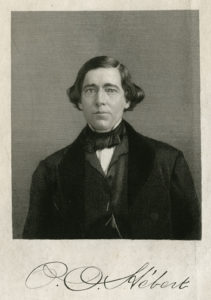Paul Octave Hebert
Democrat Paul Hebert, who served as governor of Louisiana from 1853 until 1856, helped improve the state's educational system and promoted the development of additional modes of transportation, including ferries, boats, and railroads.

Courtesy of The Historic New Orleans Collection
Paul Octave Hebert. H. & A. Cohen (Publisher)
Democrat Paul Hébert, who served as governor of Louisiana from 1853 until 1856, helped improve the state’s educational system and promoted the development of additional modes of transportation, including ferries, boats, and railroads. He is perhaps best remembered, however, for his service in the Confederate Army during the Civil War (1861-1865). Rising from colonel to brigadier general, Hébert fought in the Battle of Milliken’s Bend, part of the Vicksburg Campaign, and supervised the Confederate troops in Louisiana.
Paul Octave Hébert was born on Acadia Plantation in Iberville Parish on December 12, 1818, the son of Paul Gaston Hébert and Mary Eugenis Hamilton Hébert. In 1836 Hébert graduated from Jefferson College in St. James Parish at the head of his class. He went on to study at West Point from 1836 until 1840, again graduating first in his class. After working as an assistant professor of engineering at West Point until 1842, Hébert served as engineer for the Port of New Orleans. During that period, he married his first wife, Cora Wills Vaughn, with whom he had five children.
Hébert resigned from the U.S. Army in 1845 after Governor Alexandre Mouton appointed him civil engineer for the state of Louisiana. In 1847 he was commissioned aide-de-camp to then Governor Isaac Johnson but resigned to serve in the Mexican War (1846-1848) as a lieutenant colonel of the 14th Regiment of the U. S. Infantry. He fought in all the major battles, rising to the rank of colonel under General Winfield Scott. Honorably discharged in New Orleans on July 25, 1848, Hébert returned to his home near Bayou Goula in Iberville Parish, where the citizens presented him with a jeweled sword.
Hébert ran as a Democrat for the state senate in 1849, losing by just nine votes. In 1852, he was elected delegate to the state constitutional convention, where he opposed using the state’s total population as the basis for apportioning seats in the state legislature. Despite his opposition to the Constitution of 1852—which, among other things, shortened the standing governor’s term—Hébert benefited from its ratification. He successfully campaigned for the office of governor in an off-year election, defeating Whig candidate Louis Bordelon in 1853. Ill on inauguration day, Hébert took the oath of office at his home.
As governor, Hébert supported railroad construction, improved navigable streams, and promoted land reclamation. He also advocated the use of ferries as a mode of transportation. However, his greatest achievements were, perhaps, in the area of public education. He supported the establishment of Louisiana State University and helped establish a public library in the Louisiana House or Representatives. He also reorganized the state militia in an attempt to help it operate more effectively.
After leaving the governor’s office, Hébert returned to his sugar plantation, Home Place, where he raised racehorses and became president of the Metairie Jockey Club. In 1860 Governor Thomas Overton Moore appointed him to a military board to prepare Louisiana’s defenses in anticipation of the Civil War (1861-1865). Commissioned brigadier general in the Confederate Army, Hébert was placed in charge of Confederate troops in Louisiana. After engaging in the Battle of Milliken’s Bend in June of 1863, he took command of the eastern sub-district of Texas, remaining there until the end of the war.
After the war, Hébert returned to his sugar plantation. He became a Liberal Republican in 1872 and Ulysses S. Grant subsequently appointed him to several engineering boards. After the death of his first wife, Hébert married Penelope Lynch Adams Andrews, with whom he had six children. In 1879 he was stricken with paralysis. Hébert died on August 29, 1880, and was interred in the Catholic graveyard in Bayou Goula.
Adapted from William H. Adams’s entry for the Dictionary of Louisiana Biography, a publication of the Louisiana Historical Association in cooperation with the Center for Louisiana Studies at the University of Louisiana, Lafayette.
Sources: Albert Leonce Dupont, “The Career of Paul Octave Hébert, Governor of Louisiana, 1853-1856,”Louisiana Historical Quarterly, XXXI (1948); Dictionary of American Biography, VIII (1946).
